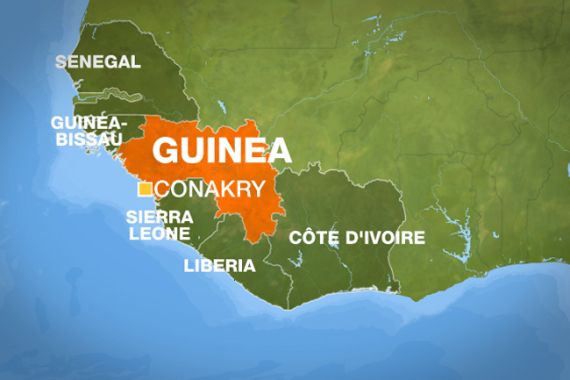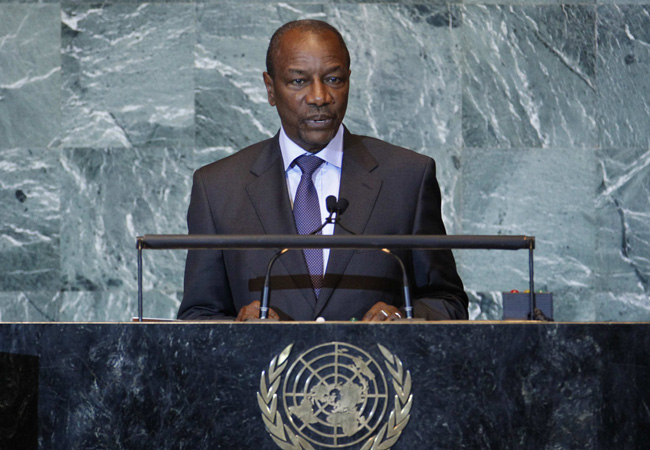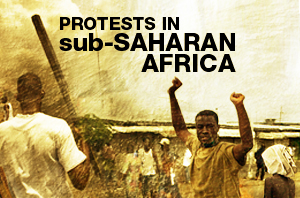Deadly crackdown on protests in Guinea
At least four people killed in clashes between police and protesters claiming president is trying to rig December poll.

 |
| Conde came to power after a disputed election in late 2010 [Reuters] |
At least four people have died after security forces used truncheons and tear gas to break up an opposition protest in Conakry, the capital of Guinea.
The West African state is preparing for December parliamentary election which the opposition allege is being rigged by President Alpha Conde who came to power after a disputed November 2010 election that ended military rule.
Cellou Dalein Diallo, the leader of the opposition, told the AP news agency by telephone on Tuesday, that one of the four dead bodies was dumped in front of the headquarters of his party, the Union of the Democratic Forces of Guinea.
Three others were at the local morgue, he said.
Mohamed Said Fofana, the prime minister, addressed the nation later on Tuesday evening on state television.
Fofana said 23 police officers were hospitalised with injuries after being hit by rocks thrown by protesters.
He said just two people had died, but reporters who were present when he visited the local morgue said the premier arrived after one of the three bodies stored there had already been picked up by relatives.
“We deplore these acts, which do nothing to advance our democracy and we regret that blood of another Guinean has once more been spilled,” Fofana said.
The opposition had expected to rally supporters from the majority-Peul areas lining the Route du Prince, a major artery that runs across the neighborhoods of Bambeto, Matato, Enco-5 and Cosa – all of which voted in
large numbers for Diallo.
Rare gesture
On Monday, the government announced that the march was authorised to go ahead, a rare gesture in a nation which last year saw the military hand power to civilians for the first time since 1984.
 |
| Click for more coverage on sub-Saharan Africa |
That vote was considered the first democratic transfer of power in Guinea’s history, but the poll was marred by days of clashes pitting Diallo’s Peul supporters with the mostly-Malinke security force backing the successful
candidate, Conde, who is himself a Malinke.
Despite the annoucement, opposition leaders including Diallo were not able to even leave their homes for the first part of Tuesday morning after riot police took positions at the main intersections and fired tear gas grenades at
anyone attempting to assemble.
Pro-opposition youths began hurling rocks, intensifying the standoff and by early afternoon, witnesses said the police began using live rounds in at least one district – Matoto.
Despite that, several residents described the dispersal of the march as less violent than Guinea has been accustomed to in the past.
In 2009, the red-beret wearing presidential guard opened fire with machine guns on a pro-democracy demonstration inside the national soccer stadium, killing scores of people.
Diallo was among those injured and was evacuated to France for treatment.
“What is remarkable is that the police units are using riot control tools to disperse the protesters – tear gas and night sticks, and not fire arms for the most part,” said shopkeeper Souleymane Sow, a Peul who was backing Diallo.
“It’s my opinion that the repression I’m seeing is not too violent compared to what we are used to.”
Nascent democracy
The march marks the first major demonstration since the historic election 10 months ago.
Many hope the civilian-led government will put an end to abuses by the army and were reassured on Monday when Army Chief of Staff Souleymane Kelefa Diallo ordered soldiers via a broadcast on state television to stay inside their barracks on Tuesday.
Mouctar Diallo, a Peul politician who helped organise the Tuesday march, said the police have a long way to go in the nascent democracy.
He charged that they had deliberately blocked the movement of people in Peul neighbourhoods.
“Yesterday the government promised to ensure the security of our peaceful march, but in fact what we are now witnessing is an assault by the gendarmerie exclusively on neighborhoods that are favourable to the
opposition,” said Diallo.